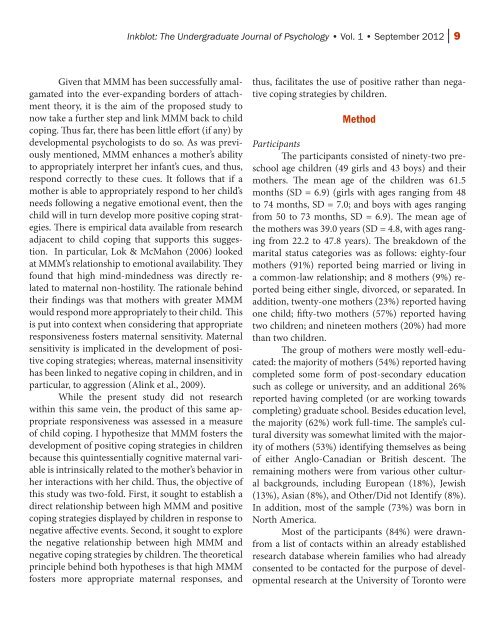7-17-Claire-Banga-Maternal-Mindedness
7-17-Claire-Banga-Maternal-Mindedness
7-17-Claire-Banga-Maternal-Mindedness
You also want an ePaper? Increase the reach of your titles
YUMPU automatically turns print PDFs into web optimized ePapers that Google loves.
Inkblot: The Undergraduate Journal of Psychology • Vol. 1 • September 2012 | 9<br />
Given that MMM has been successfully amalgamated<br />
into the ever-expanding borders of attachment<br />
theory, it is the aim of the proposed study to<br />
now take a further step and link MMM back to child<br />
coping. Thus far, there has been little effort (if any) by<br />
developmental psychologists to do so. As was previously<br />
mentioned, MMM enhances a mother’s ability<br />
to appropriately interpret her infant’s cues, and thus,<br />
respond correctly to these cues. It follows that if a<br />
mother is able to appropriately respond to her child’s<br />
needs following a negative emotional event, then the<br />
child will in turn develop more positive coping strategies.<br />
There is empirical data available from research<br />
adjacent to child coping that supports this suggestion.<br />
In particular, Lok & McMahon (2006) looked<br />
at MMM’s relationship to emotional availability. They<br />
found that high mind-mindedness was directly related<br />
to maternal non-hostility. The rationale behind<br />
their findings was that mothers with greater MMM<br />
would respond more appropriately to their child. This<br />
is put into context when considering that appropriate<br />
responsiveness fosters maternal sensitivity. <strong>Maternal</strong><br />
sensitivity is implicated in the development of positive<br />
coping strategies; whereas, maternal insensitivity<br />
has been linked to negative coping in children, and in<br />
particular, to aggression (Alink et al., 2009).<br />
While the present study did not research<br />
within this same vein, the product of this same appropriate<br />
responsiveness was assessed in a measure<br />
of child coping. I hypothesize that MMM fosters the<br />
development of positive coping strategies in children<br />
because this quintessentially cognitive maternal variable<br />
is intrinsically related to the mother’s behavior in<br />
her interactions with her child. Thus, the objective of<br />
this study was two-fold. First, it sought to establish a<br />
direct relationship between high MMM and positive<br />
coping strategies displayed by children in response to<br />
negative affective events. Second, it sought to explore<br />
the negative relationship between high MMM and<br />
negative coping strategies by children. The theoretical<br />
principle behind both hypotheses is that high MMM<br />
fosters more appropriate maternal responses, and<br />
thus, facilitates the use of positive rather than negative<br />
coping strategies by children.<br />
Method<br />
Participants<br />
The participants consisted of ninety-two preschool<br />
age children (49 girls and 43 boys) and their<br />
mothers. The mean age of the children was 61.5<br />
months (SD = 6.9) (girls with ages ranging from 48<br />
to 74 months, SD = 7.0; and boys with ages ranging<br />
from 50 to 73 months, SD = 6.9). The mean age of<br />
the mothers was 39.0 years (SD = 4.8, with ages ranging<br />
from 22.2 to 47.8 years). The breakdown of the<br />
marital status categories was as follows: eighty-four<br />
mothers (91%) reported being married or living in<br />
a common-law relationship; and 8 mothers (9%) reported<br />
being either single, divorced, or separated. In<br />
addition, twenty-one mothers (23%) reported having<br />
one child; fifty-two mothers (57%) reported having<br />
two children; and nineteen mothers (20%) had more<br />
than two children.<br />
The group of mothers were mostly well-educated:<br />
the majority of mothers (54%) reported having<br />
completed some form of post-secondary education<br />
such as college or university, and an additional 26%<br />
reported having completed (or are working towards<br />
completing) graduate school. Besides education level,<br />
the majority (62%) work full-time. The sample’s cultural<br />
diversity was somewhat limited with the majority<br />
of mothers (53%) identifying themselves as being<br />
of either Anglo-Canadian or British descent. The<br />
remaining mothers were from various other cultural<br />
backgrounds, including European (18%), Jewish<br />
(13%), Asian (8%), and Other/Did not Identify (8%).<br />
In addition, most of the sample (73%) was born in<br />
North America.<br />
Most of the participants (84%) were drawnfrom<br />
a list of contacts within an already established<br />
research database wherein families who had already<br />
consented to be contacted for the purpose of developmental<br />
research at the University of Toronto were



